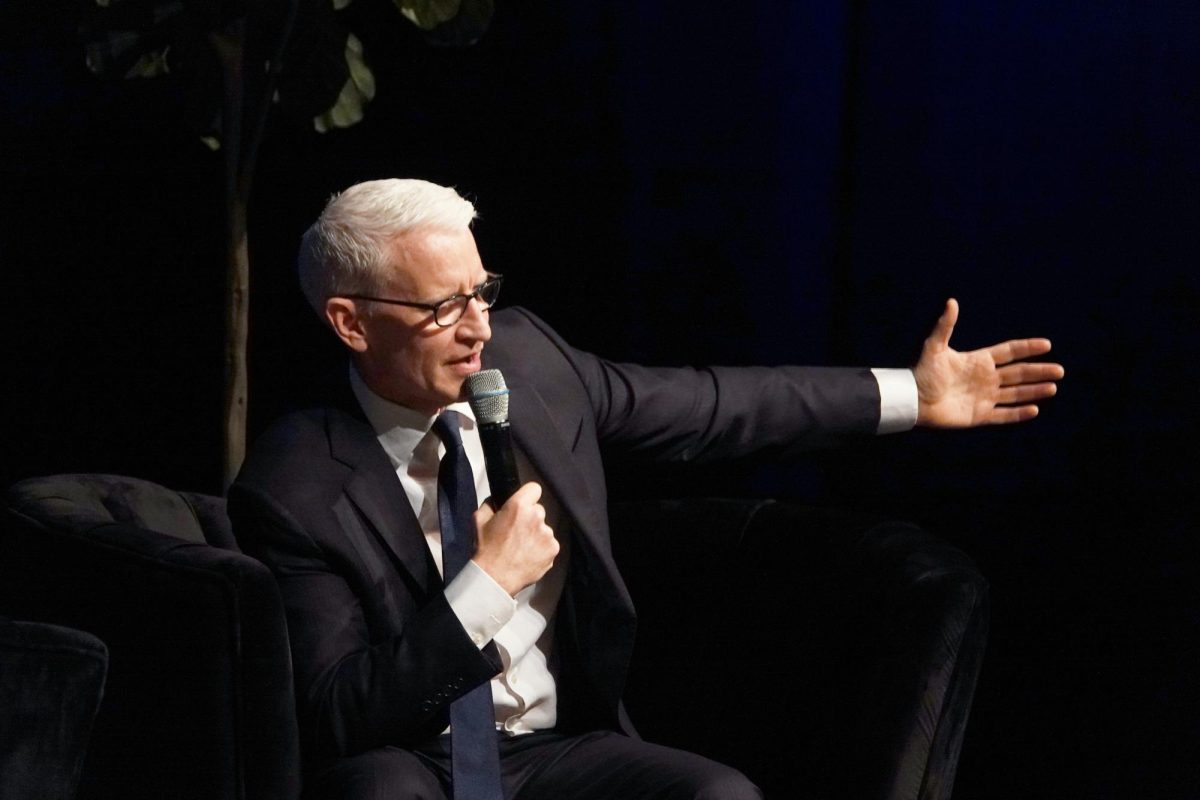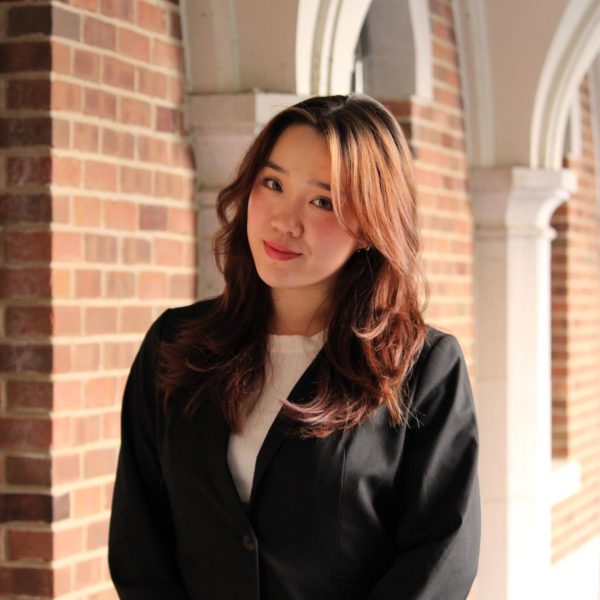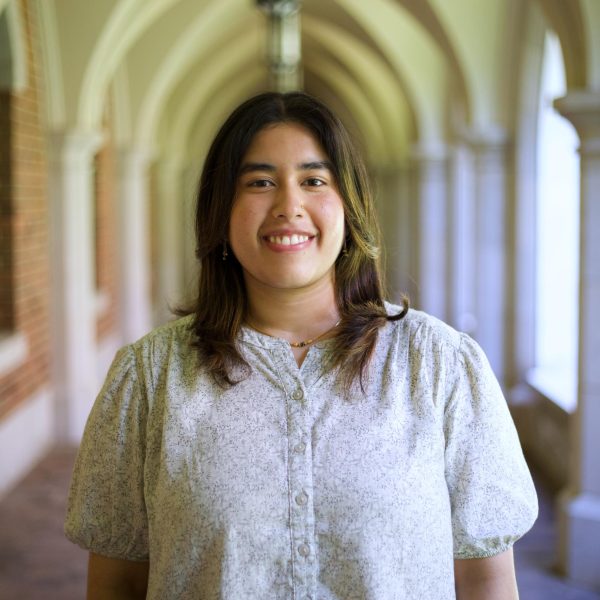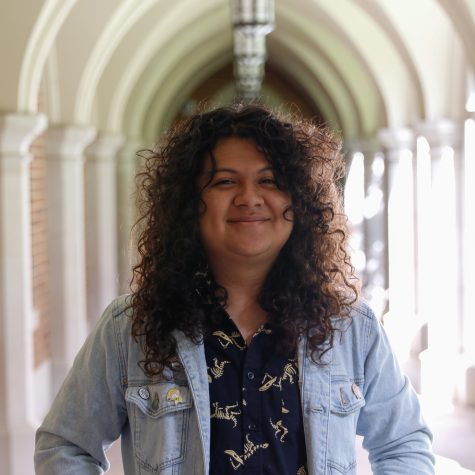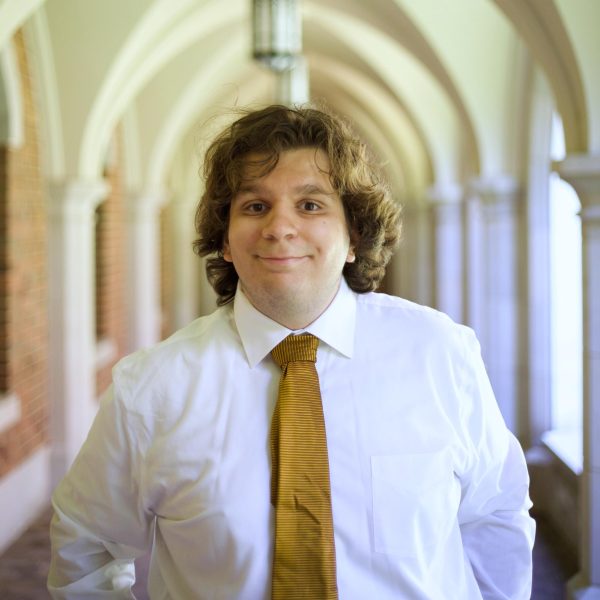Vanderbilt Programming Board hosted the 60th annual IMPACT Symposium speaker series featuring journalist Anderson Cooper on March 21 and comedian Ziwe Fumudoh on March 26.
IMPACT is among the oldest university lecture series across the United States. This year’s programming centered on the theme “Voices of Truth: Navigating Identity, Journalism and Social Commentary.”
Anderson Cooper
Cooper is an award-winning broadcast journalist for CNN and CBS known for his political commentary. In an hour-long conversation moderated by political science professor Sharece Thrower, Cooper discussed his early career and subsequent criticism, the changes in the journalism industry in the past few decades, personal grief and loss and his identity in relation to the Vanderbilt legacy.
After studying political science at Yale and having no solid career plan other than a sure interest in politics and international relations, Cooper decided to pursue a career as a foreign correspondent. With a borrowed home-video camera in one hand and a fake press pass in the other, Cooper shot stories in Burma and Somalia for Channel One News, covering famines and civil wars in the hopes of becoming a foreign correspondent.
According to Cooper, the stories of loss he encountered were a coping mechanism for the personal grief he dealt with growing up. Cooper’s father passed away when he was 10 years old, and his brother died by suicide when Cooper was in his early 20s.
“When you lose a parent early on, unfortunately, one way a lot of kids deal with it is [by keeping their emotions] buried and bottled up,” Cooper said. “I was compelled to go places where people were suffering, so I could at least deliver for people the language of loss.”
At age 27, ABC News hired Cooper as their youngest correspondent in many years, a “rare” career opportunity he attributes to both taking on unconventional roles early on in his career, as well as channeling his personal experience with loss.
Cooper is the son of Gloria Vanderbilt, and as her only surviving son, Cooper is the last surviving member of his nuclear family. After his mother passed away at 95, Cooper described sorting through her belongings as an “incredibly lonely and incredibly sad” process.
According to Cooper, his mom had a very fractured relationship with the Vanderbilt family. As a result, he “never wanted anything to do with the Vanderbilts.”
“Seeing the pain behind my mom’s eyes based on the lack of family she’d never had, I saw my dad who grew up very poor in Mississippi in this larger family, and I was like, ‘I’m a Cooper’ because the Coopers seemed more normal to me,” Cooper said.
Discussing changes in the journalism industry, Cooper said he believes the diversity of voices reporting the news has vastly increased since he first joined the scene, as have the news cycle’s “overwhelming” speed and political polarization. Thrower said she enjoyed hearing Cooper’s perspective on polarization.
“We have a lot of accusations and biased and partisan media sources, and that’s so important because that just perpetuates the partisan divides within the population,” Thrower said. “The way that [people] process that information has become much more biased as well, so people hear what they want to hear.”
For aspiring journalists, Cooper gave his mother’s advice of following one’s “bliss.” He recommended students to find something to do that does not feel like work.
“It doesn’t necessarily mean it’s the most fulfilling thing in your life, but it’s got to be something that you wake up every day to and not completely dread,” Cooper said. “If you can find something that you are passionate about, you will be able to work harder than anybody else because it doesn’t feel like work.”
VPB Co-Vice President Justin Luckner, a senior, said he resonated with Cooper’s advice and was excited to bring a speaker with an atypical career path to Vanderbilt, where he said students might feel stuck in following expected career paths.
“[Because] Cooper spoke about advice for students [or] people that want to go into journalism, I think we definitely [need to] look for people that are role models for students in terms of career diversity,” Luckner said.
Ziwe Fumudoh
Fumudoh is a comedian, writer and actress renowned for her salient discussions of race and politics in the U.S. She hosts her own late-night variety sketch show titled “Ziwe” and published a book titled “Black Friend: Essays” last year. She was named in Forbes 30 Under 30 and as one of TIME’s 100 Next Gen Leaders.
The conversation was moderated by senior Lina Waseem, co-chair of the VPB Music Group Committee. The discussion questions focused on Fumudoh’s inspiration to do comedy, what she hopes others take away from her work and advice for students looking to pursue their own creative paths.
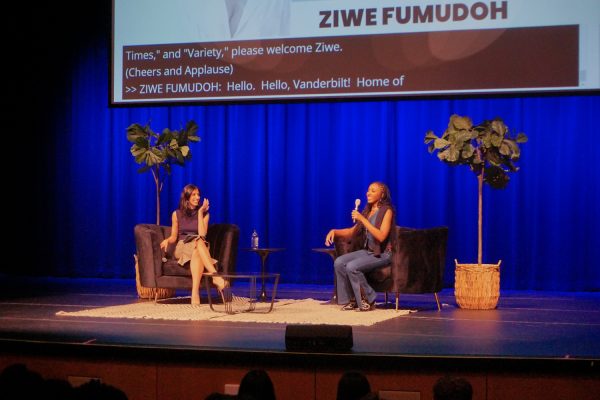
In her talk, Fumodoh shared that it is not always necessary to know exactly what one wants to pursue when you first enter college. She said she realized comedy was what she wanted to do only after trial and error through internships and other jobs.
“I did every single major. I took a very long time to find out what I even wanted from school,” Fumudoh said. “I did an internship with The Onion, and I went to improv classes in Chicago. I found the thing that I liked, and I attacked it.”
When asked what she hopes others take away from her unapologetic approach of addressing controversial topics, Fumudoh shared that her main goals are to make people laugh and inspire them to create their own media.
“However you feel about my contribution [to art] or my work, if it activates you to make something that fuels dialogue or is something totally against it, I’m excited about that,” Fumudoh said.
When Waseem informed Fumudoh about the sit-in protest at Kirkland Hall occurring simultaneously with the event, Fumudoh advised students to make their voices heard in order to challenge societal norms and address uncomfortable truths.
“The most valuable thing that you have is your own unique perspective,” Fumudoh said. “If you’re asking about social activism and what that means in terms of my art, [you have to] use your voice to say something.”
During the COVID-19 pandemic, Fumudoh started publishing her content on social media through an Instagram Live show titled “Baited with Ziwe.” In response to being asked where she found the courage to change gears from live audiences to social media, she answered “delusion” but also said it was important to find a community to support her through it.
“Embrace the cringe, be the cringe that you want to see in the world,” Fumudoh said. “Your peers are sitting right next to you, so make a community and work together, support each other and give each other notes; foster relationships.”
Her last piece of advice was for college students aspiring to go into journalism.
“I love journalists. You are the bedrock, the foundation of democracy,” Fumudoh said. “To young journalists, find your own voice. Ask yourself, ‘What do I like? What do I want to write about? What do I have to say?’ Stand in your truth 10 toes down. Apologize when you need to, apologize if you mean it, but otherwise, be you.”
First-year Jason Vadnos said he enjoyed the uniqueness of Fumudoh’s “playful attitude” to questions she was asked and expressed hope in seeing more young speakers being brought to campus.
“I loved the free-flowing nature of the discussion, as well as [Fumudoh’s] willingness to interact with the audience and be here not just as a speaker but as someone to directly relate to and connect with,” Vadnos said in a message to The Hustler. “Her authentic sense of self shone through both in her response to the interview questions and in her storytelling.”

